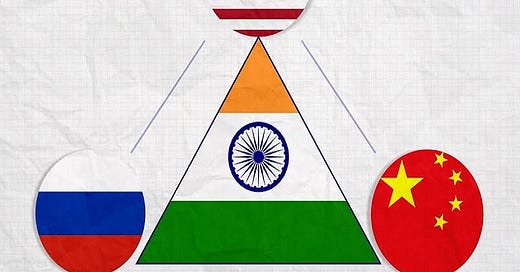Lavrov Appreciates That India Refused To Join The US’ Alliances Against Russia & China
Observers need to accept this objective conclusion regardless of their feelings about its joint military drills with the US or stance towards the Kashmir Conflict as their failure to do so will inevitably result in them producing inaccurate assessments of Indian grand strategy and thus struggling to predict multipolar processes.
Russian Foreign Minister Lavrov praised India during a press conference last week for refusing to join the US’ alliances against his country and China. According to him, “They wanted to draw India into their anti-China and anti-Russia alliances, but India refused to join any alliance that was formed as a military-political bloc. New Delhi is only taking part in economic projects offered in the context of Indo-Pacific strategies.” This is an accurate assessment that’ll now be briefly analyzed.
Up until the latest phase of the Ukrainian Conflict broke out earlier this year, it was unclear to casual observers whether India had the political will to retain its decades-long strategic relations with Russia under maximum Western pressure. This South Asian state had successfully struck up its own strategic relations with the US over the past half-decade driven by their shared desire to manage China’s rise so it therefore followed that a credible basis existed for America to impose a zero-sum choice upon it.
What ultimately unfolded caught everyone off guard after India not only rebuffed the US’ unprecedented pressure to dump Russia, but comprehensively expanded their strategic relations in full defiance of that declining unipolar hegemon’s demands. At the same time, its strategists masterfully balanced between the US-led West’s Golden Billion and the jointly BRICS- & SCO-led Global Majority of which their country is nowadays the voice in order to become the kingmaker in the New Cold War.
This geostrategically game-changing outcome wouldn’t have been possible had India agreed to join either of the US’ alliances aimed at indefinitely delaying the global systemic transition to multipolarity. Despite its complicated ties with China, India wisely avoided the trap that the US was setting for it wherein Delhi would become Washington’s proxy against Beijing until the last Indian. Likewise, it refused to do anything that would be at the expense of its Russian strategic partner’s interests.
The past nine months have indisputably proven that India is truly an independent player in the global systemic transition exactly as President Putin praised it for being in late October. Observers need to accept this objective conclusion regardless of their feelings about its joint military drills with the US or stance towards the Kashmir Conflict as their failure to do so will inevitably result in them producing inaccurate assessments of Indian grand strategy and thus struggling to predict multipolar processes.




